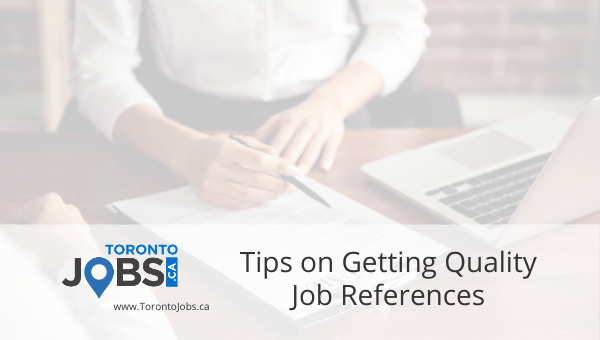Tips on Getting Quality Job References
Posted: 07.29.2020 References can add a lot of value to a person during the hiring process, which is why it has a lot of impact and can even make or break a job opportunity.
References can add a lot of value to a person during the hiring process, which is why it has a lot of impact and can even make or break a job opportunity.Below are some tips on finding quality references.
1. Make sure your references are available.
Confirm the availability of your references – are they going out of town within the next couple of days, are they available during the day to take a phone call, etc. You don’t want your potential employer chasing your references or worse, not even bothering to contact them at all. It’s also a good idea to provide your references with information on who will be reaching out to them like their name and the company they work for.
2. Confirm your references information.
Make sure you get the most up-to-date contact information from your references:
- their full name
- their position title and place of employment
- their e-mail address and phone number
3. Give a copy of your cover letter and resume to your references.
This will help give your references a better idea about what position you are applying to and give them a quick overview of your past work experience, so they can better speak about you in the interview.
4. Provide references even when perspective employers don’t ask for it.
One way of doing this is to provide a list of references with their contact information before the start of your interview, slipping it in when you provide an extra copy of your cover letter and resume.
5. Try to find out what your references may say about you in advance.
Follow-up with your references to try and get an idea about what they may have said in their conversations with your perspective employer. Whether good or bad, this will better prepare you in case your perspective employer approaches you with some questions after speaking to your references.
6. Thank your references.
Make sure you remember to thank your references once they speak to your perspective employer. It’s also nice to give them an update as to whether you got the job. Keeping a good rapport with your reference will help you in the long run. Maybe you’ll need them to be a reference again, maybe they’ll think of you if a job opportunity pops up at the company they work at, etc.
7. You can use a friend as a reference but be cautious.
If you’re going to use your friend as a reference, make sure to include two or three more references from people who directly worked with you or reported to. Friend references are okay for using as character references, but recruiters really want to see what type of worker you are by having a conversation with a previous manager, supervisor, or co-worker.
If you’re still in school and you’re looking for a part-time job during the summer, using someone like a professor is a great alternative. They can speak to your work ethic based off how you work with other students on projects and whether assignments are completed on time, etc.
It’s also not an uncommon practice for perspective employers to run a credit and criminal record check prior to hiring you, so you should be aware of this potential step as well.
Click here to watch President of TorontoJobs.ca Marc Belaiche, CPA, CA discuss this topic.
Want more job tips? Click here to check out the TorontoJobs.ca YouTube Channel for more.
Interested in attending one of our virtual events? Check out our full events listing here.
TorontoJobs.ca is a full-service recruitment organization, including TorontoJobs.ca Website, Career Fairs, full-service Recruitment Division and Outplacement Services. The local focus and advanced features make TorontoJobs.ca a vital asset for both job seekers and employers within the Greater Toronto Area. Visit our Online Career Centre for additional articles on Career Development, Personal Branding and more!



